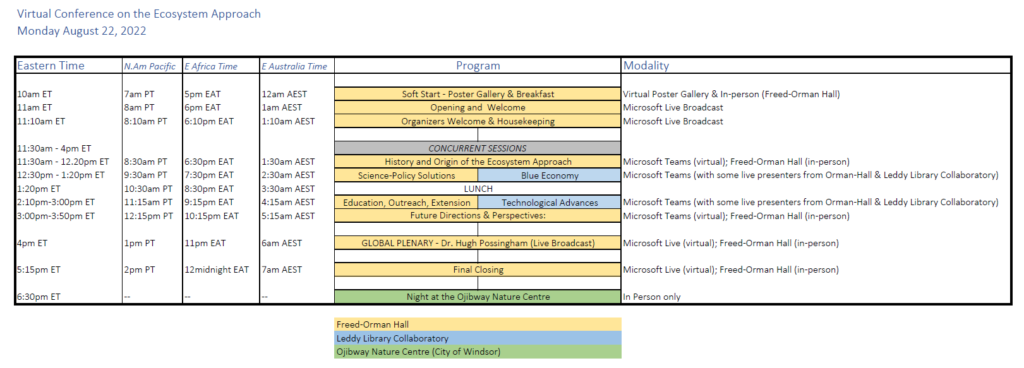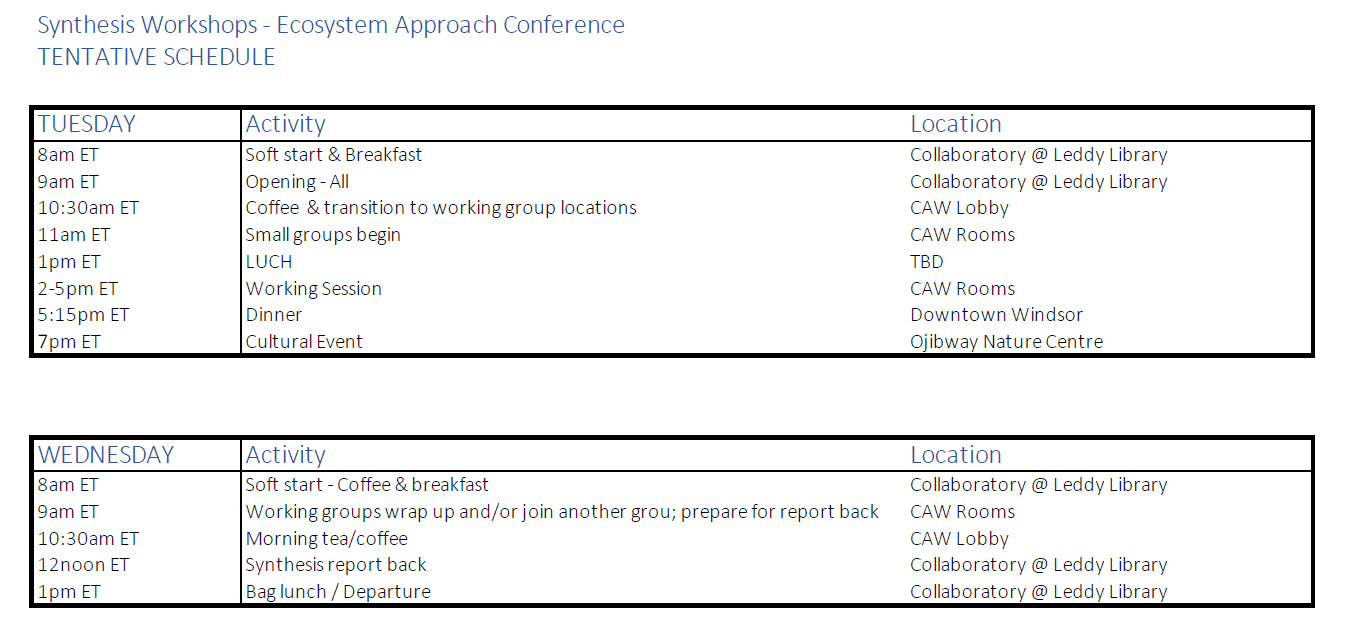Event Format and Outputs
This hybrid event will consist of a virtual one-day conference followed by an invitation only two-day in-person work summit.
The virtual one-day conference will bring together a global network of research, policy, practice and community; we will encourage inclusivity and diversity through a mix of poster and oral presentations and invited plenaries. We welcome experts and practitioners from around the world to share knowledge, conduct a critical review and make recommendations for how to improve application of the ecosystem approach.
Informed and galvanized by the preceding global event, the 2-day summit will follow as an in-person, invitation-only gathering of smaller working groups tasked with delivering draft synthesis manuscript and collation of case studies. The series of outputs will include a special issue in the journal of Aquatic Ecosystem Health & Management followed by an Ecovision World monograph and extend beyond to traveling discussion series and contribution to the Great Lakes Public Forum.
Updated Schedule
Download the tentative schedule in PDF.
Overview
As we enter a new year, nearly two years into a global pandemic, many have reflected on our relationships with the watersheds and communities that we call home. Never before has our connection with natural ecosystems and society been more inextricably connected, with access to the Great Lakes offering vital support to our health, vitality and well-being.
Ecosystems are complex, dynamic and integrated natural systems that produce goods and services to society and have substantial intrinsic value. An ecosystem approach accounts for the interrelationships among air, water, land, and all living things, including humans, and involves all user groups in comprehensive management.
The Ecosystem Approach has long served as a collaborative framework for governing, researching and stewarding the health of the Great Lakes. Operationalized through the Great Lakes Areas of Concern and remedial action plans (RAPs), we now have over 40 years of experiences in applying an ecosystem approach in both science and management. It is time to take stock of where the ecosystem approach has originated, where we are now in terms of its application, and what is its future direction.
The ecosystem approach has been designed for a particular place and a set of stakeholders. As such, they are frequently referred to as locally-designed ecosystem approaches, and yet there are many universal themes that connect these approaches to one another around the world. From the Great Barrier Reef of the coast of Australia to the African Great Lakes watersheds among others. Relationships with our Original peoples of Turtle Island have continued to strengthen and expand across science and management teams and local communities. Progress towards more holistic and strategic approaches to working with natural ecosystems and people is being made. And yet at the same time, the state of our planet and the diverse biodiversity upon which we depend have become critically imperiled despite such efforts. Recognizing the diverse ways in which people and ecosystems are inextricably linked, and a heightened global awareness of the ecosystem approach as being critical in managing future complexities, we propose a hybrid virtual one-day conference & two-day in-person work summit entitled “The Ecosystem Approach in the 21st Century: Guiding Science and Management” hosted by the University of Windsor. This hybrid meeting – the first of its kind – seeks to achieve a balance between the importance of global collaboration and connection, and the mission-driven, high-impact outcomes that can come from focused in-person gatherings.
Conference Abstract Submission
Conference participants are invited to submit abstracts for virtual oral presentations (12 mins) or posters (1 slide) in one of the conference themes and sessions.
Pre-recorded virtual talks, virtual poster galleries and live Q&A panels will be hosted in addition to live conference-style breaks & plenary talks.
If you are interested in submitting an abstract please fill in the Abstract Submission form. Note that there is a registration fee for the 1-day conference which is required for the presentation of your paper. The deadline for abstract submission and registration to present has been extended to July 31, 2022.
Abstracts for the Days 2 & 3 workshops should be submitted to session leads along with this google form: https://forms.gle/PBrNUYf4xWejKLZKA.



